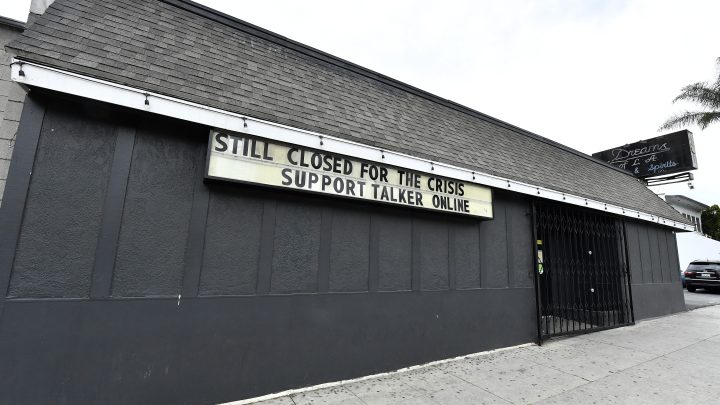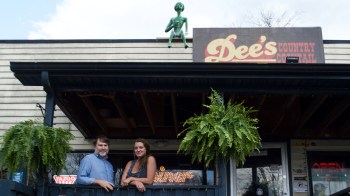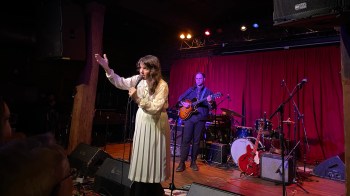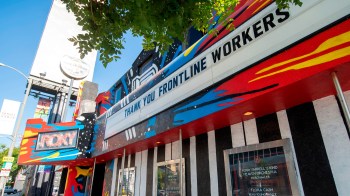
How independent musicians are planning for 2021

According to a survey by the National Independent Venue Association, 90% of independent music and entertainment venues are in danger of closing permanently without additional federal funding. As Congress continues to negotiate over another COVID-19 relief package, “Marketplace” host Kai Ryssdal checked in with the rapper and writer known as Dessa to talk about how the musicians who perform on those endangered stages are planning for 2021. The following is an edited transcript of their conversation.
Kai Ryssdal: So when we spoke at the beginning of this thing, back in March, your calendar, your gig calendar had just, like, vaporized. And I wonder, eight months, nine months later on, how it’s been through this whole summer and fall?
Dessa: I mean, in some ways, I think most musicians are still looking at calendars that don’t have too much ink on them … I remember talking to my agent. And he was like, you know, “Use this time. When this is all over, you want to look back and be able to say you really spent this time making something wonderful.” And I remember, like, a month after getting that counsel, I was just like, this is not a writer’s retreat, man! This is, like, a global crisis. I don’t want to spend my days thinking about what rhymes with “plague.” So, in the beginning, there was sort of a lull, but now, eight months in, you can hear the wheels humming again, you know? People are writing rad stuff. And I think, as a consumer of music too, I found myself leaning harder on art for comfort and distraction, and all the things that we turn to art for.
“Turning music into groceries”
Ryssdal: Yeah. Well, so look, we all turn to art for comfort and distraction, those of us on the consuming end. Those of you on the producing end turned to art to pay the rent. And I don’t imagine you’ve been able to do that. I mean, maybe you’re making your rent, I don’t know, that’s none of my business. But the point is, you can’t really profit off of your art when your gig calendar has gone away.
Dessa: Right. And even before the pandemic, like, the alchemy of turning music into groceries had gotten really complicated. It had, and for all the reasons that a consumer can anticipate. Most of us listen to some streaming services, very few of us have two walls of our bedroom covered in vinyl. And so, in the beginning, there were a lot of virtual concerts, then I think a lot of us got pretty screened out as this thing rolled on. But there have been some exceptions — the cultural phenomenon that is Verzuz, where artists kind of battle it out, that’s been a big win, obviously. But also, Patreon?
Ryssdal: Oh, yeah.
Dessa: Yeah, like the subscription models for art, essentially. That has really boomed.
Ryssdal: Which is cool, right, I mean, that’s great that there’s that resource for artists and musicians and others. But at some point, you’re going to have to, and you’re going to want to, and you’re going to be able to get back into actually performing. And there are going to be clubs that open and venues that open. What do you anticipate that’s going to be like? Because so many things in this economy have changed, and you have to believe that that sector, that space has as well.
Fewer stages for musicians
Dessa: You know that scene in a movie where, like, someone is sitting alone, trying to figure out where the other survivors are, so they’re tuning a radio to see who might still be out there? I think we’re approaching that scene. Like, we’ve got all these artists out here who are going to be watching the news to try to figure out what’s the timeline for the vaccine? When is it going to be healthy and safe to go back on the road? But of course, we’re all going to want to go at exactly the same time.
The task then, as we’ve got less inventory in these stages and a huge, huge number of musicians trying to play, is that when you don’t get matched with the right room, you can take a serious financial hit. So, you know, in Seattle, which is one of my strongest markets — like, the best I’ve ever done, on my luckiest night, was just over 900 heads paid — well, if I can’t get into a 900 [capacity] room, and I’ve got to take a 500 cap, well, that bites into the bottom line. And on the other hand, if I can’t get into a 900 cap, and so I got to play a 2,000 cap, in addition to being a very humbling evening for young Dess, like, I know, I have to pay for all of this, like, security staff that’s unnecessary, right, that there’s a bottom line just to turn the lights on. So we end up with a lot of waste around the edges in a time when we’re really hard pressed to tolerate any waste at all.
Ryssdal: But I imagine you’re still jonesing to get out there, right?
Dessa: Yes, like, I’m eager, I miss it. And also — I mean, this is just emo — but it’s just such a big part of who I thought I was. Like, as a human being, let alone as a professional.
There’s a lot happening in the world. Through it all, Marketplace is here for you.
You rely on Marketplace to break down the world’s events and tell you how it affects you in a fact-based, approachable way. We rely on your financial support to keep making that possible.
Your donation today powers the independent journalism that you rely on. For just $5/month, you can help sustain Marketplace so we can keep reporting on the things that matter to you.


















